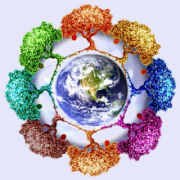Webecology

Internet is really a diversified environment. Most people think that Internet and the World Wide Web are the same thing, but this is not true: the web is just a piece of Internet. For example, let us consider discussions. In the past, most discussions were published on USENET newsgroups, which could be accessed by using an NNTP-enabled reader. This is still true, that is, a lot of people is still using newsgroups, but today most discussions moved to web-based forums. There are pro and con, of course. For example, you can access any newsgroup you like by logging to a USENET server, and if you log to a content-rich server you may have access to many thousands newsgroups at the same time. You cannot do the same with web-based forums: they are on different sites and you have to register to each one. On the other hand, most people is able to use a browser and you do not need to load posts on your own computer to read a web-based forum: you can do it from any PC or even a smartphone, if you are a registered user. On forums you can load images and sometimes video, as well as you can use rich text. Some newsreader does support rich text too, of course, but that is not the standard. Furthermore rich text is supported by HTML in newsgroups, exposing users to hacker attacks. You risk mostly nothing if you read forum posts formatted using BB codes, unless the attack is hidden inside an image or a video.
So, most people today use forums to discuss of mostly any topic: politics, environment, sports, arts, news, and so forth. If you look at a typical thread of a forum, you will see that many participants are used to quote posts which they are replying to. When you quote a post, the text contained in the quotation is duplicated and embedded in your post. So, a single post can be duplicated a lot of times by using this mechanism. This is a waste of resources.
As I said in a previous article, most people think that web resources are infinite, but they are not. We made the same error with our planet and now we are replicating this error in the web too. Whatever you upload goes somewhere in a fixed disk. The amount of storage, bandwidth, and CPU is limited, and we are continuously increasing the amount of information available inside the web. Furthermore, devices are periodically changed and only few components are reused or recycled because of their obsolescence and design, so we are generating a lot of technological garbage.
The amount of redundant information in the web is impressive. When Tim Barners-Lee invented the world wide web, he based it on a very important concept: hypertext. The idea was to share information without copying or duplicating it, but using links. Most users are not aware of that. They attach huge files to e-mails, upload the same images and videos on several sites, cut and paste pieces of texts from another blog to their own. The value of links is not exploited as it should be.
Back to forums and quotations. Let us suppose that I would develop a forum platform where each quotation is really a link to the corresponding piece of post, and that such a piece is published inside the quotation box only when the referencing article is read. From the point of view of forum participants it makes no difference. In fact, the quotation looks exactly the same, but from the point of view of storage, there is no duplication of text at all. Just multiply this saving for all the threads inside a forum, all the forums inside a forum site, all the forum sites in the web. How many thousand terabytes could we save?
This is an example of webecology, that is, to apply to the resources of the web the same approach that ecologists developed for the resources of our planet. Because every time you waste web resources, you waste planet resources too. Share the word.




















Si prega di usare Facebook solo per commenti brevi.
Per commenti più lunghi è preferibile utilizzare l'area di testo in fondo alla pagina.
Commenti Facebook